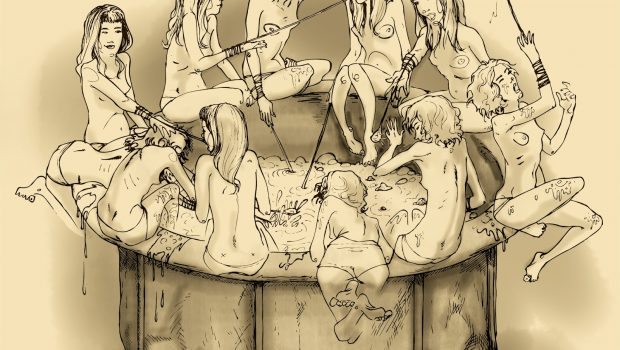Heaven and Hell – The Only Difference
When I was a young boy, I had access to a pile of old Life magazines stacked in the great room of an old hotel in the Catskill Mountains. My parents often took us there in the summer. One afternoon, I came across an intriguing photo in one of those magazines. I later learned that the photo was of a painting that illustrated a well-known tale called “The Parable of the Long Spoons.”
Legend had it that a certain Rabbi Haim, of Romshishok, Lithuania, was granted permission to visit both heaven and hell. With an angel for his guide, the rabbi is first ushered through the gates of Hell. He looks at his angelic guide in disbelief. “It’s all so beautiful,” he says. “The sight of the meadows and mountains…the sounds of the birds singing in the trees…the scent of thousands of flowers…” And then the tantalizing aroma of a gourmet meal catches his attention.
Entering a large dining hall, he sees row after row of tables laden with platters of sumptuous food; yet the people seated around the tables are pale and emaciated, moaning in hunger. Coming closer, he sees that each man is holding a long spoon, but that both his arms are splinted with wooden slats so that he cannot bend either elbow to bring the food to his mouth.
The angel then took the rabbi to Heaven, where he encountered the same beauty he had witnessed in Hell. Entering the dining hall there, he saw the same scene, but in contrast to Hell, the people seated at the tables that had their arms splintered with wooden slates were sitting contentedly, cheerfully talking with each other, as they enjoyed their sumptuous meal.
As the rabbi came closer, he was amazed to watch how each person at a table would feed the person sitting across from them. The recipient of this kindness would express gratitude and then return the favor by leaning across the table to feed his benefactor.
The rabbi urged his angel to bring him back to Hell so he could share this solution with the poor souls trapped there. Racing into the dining hall, he shouted to the first starving man he saw, “You do not have to go hungry. Use your spoon to feed your neighbor, and he will surely return the favor and feed you.”
“‘You expect me to feed the detestable man sitting across the table?” the man said angrily. “I would rather starve than give him the pleasure of eating!” It was then that the rabbi understood. Heaven and Hell offer the same circumstances and conditions. The only difference is in the way that people treat each other.
Jerry & Pat Hocek, Publishers




























